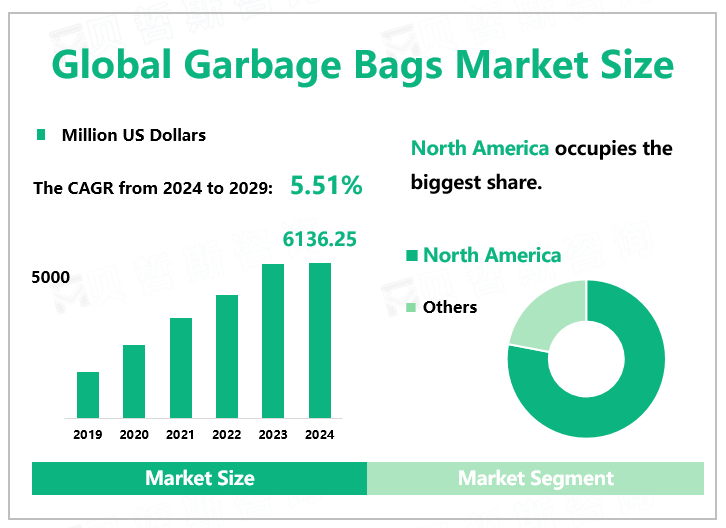Global Garbage BagsMarket Overview
According to Global Market Monitor, the garbage bags market size will reach $6136.25 million in 2024 with a CAGR of 5.51% from 2024 to 2029.
A garbage bag is a disposable bag used to contain solid waste, to keep it clean and hygienic, and is a convenient and hygienic way of garbage disposal.
North America Dominates the Garbage Bags Market.
The increasing initiatives by the government and regulatory bodies to promote the usage of trash bags are some of the significant factors that could boost the adoption of trash bags in the region over the forecast period. Increasing demand for easily disposable and eco-friendly garbage bags and awareness regarding environmentally sustainable products is expected to drive market growth. Additionally, growing awareness regarding hygiene and cleanliness among people mainly fuels the demand for such products. According to the United States Environmental Protection Agency, plastics have been a rapidly growing part of municipal solid waste (MSW). The United States produces more than 12% of the planet's municipal solid waste (MSW), though it is home to only 4% of the world's population.
Market Segment
Demand for PE garbage bags remains particularly high due to their strength and tear-resistance properties. Most PE garbage bags are made from LDPE & LLDPE, while the remaining ones are made from HDPE. Garbage bags are becoming essential in waste disposal globally. They are widely used in residential, commercial, and industrial sectors to collect and dispose of waste. The global market for garbage and waste bags is set to witness steady growth due to increasing waste generation and the ever-increasing development of residential and family houses. Consumers' disposable income and purchasing power are leading to an increasing demand for convenient and cost-effective trash bags for waste collection. Similarly, improving economic performance and rising living standards of the middle-income population are expected to boost the sales of HDPE garbage bags.

Plastic Garbage Bags Can Cause Environmental Pollution.
Most of the plastic garbage bags that people use every day are made of petroleum. Due to the huge amount of use, the waste of resources and environmental pollution are very amazing. It will take hundreds of years for the plastic bag to be buried in the ground to rot and seriously pollute the soil; if incineration is adopted, harmful smoke and toxic gases will be generated, which will pollute the environment for a long time. Plastic bags are also one of the main causes of marine pollution, and many marine lives lost their lives by eating plastic bags. Many people use plastic bags as garbage bags, but many countries and regions have banned or restricted plastic bags. The survey showed that at least 127 countries have adopted some form of legislation to regulate the use of plastic bags, restrict the use of products, import and export, and tax them. This may severely restrict the market for plastic garbage bags.
Product Innovation and Updating
With the development of technology and environmental protection requirements, manufacturers of garbage bags use more environmentally friendly materials to make products, such as biodegradable plastic bags, compostable garbage bags, and so on. The continuously improved product materials are more environmentally friendly and more in line with the requirements of environmental protection policies. Improvements in product design make the use of products more convenient, such as garbage bags with enhanced odor control. These have promoted the development of the garbage bag market.
|
By Type |
HDPE |
|
LDPE |
|
|
LLDPE |
|
|
Other |
|
|
The HDPE segment contributes the largest market share. |
|
|
By Application |
Households |
|
Schools |
|
|
Offices |
|
|
Market Places |
|
|
Restaurants |
|
|
Other |
|
|
The households segment occupies the biggest share. |
We provide more professional and intelligent market reports to complement your business decisions.